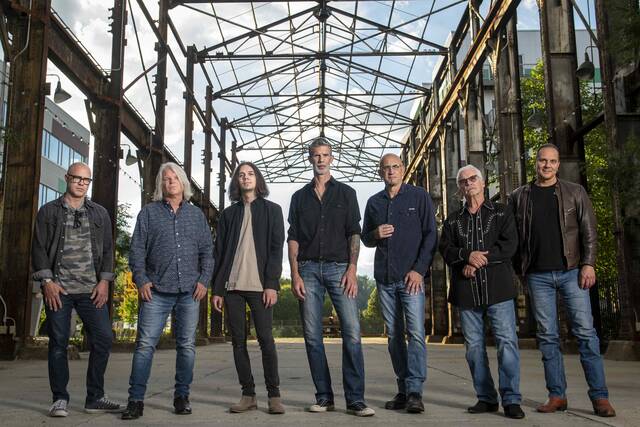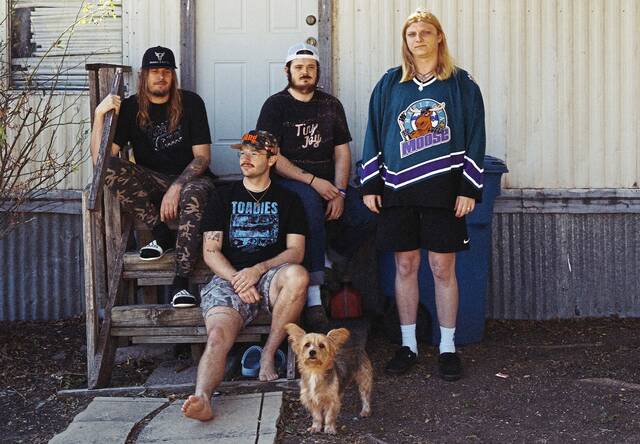In the 20 years since Abner Ramirez and Amanda Sudano formed the pop/soul/R&B duo Johnnyswim, the now-married couple has played plenty of holiday concerts.
“We’ve cut our teeth touring a lot with Christmas shows,” Ramirez said.
But an early New York City show still stands out. The duo recorded the show for a potential release, but the setlist comprised solely of Christmas songs left a few disgruntled fans who wanted to hear more.
“You can hear this dude shout from the very back of the room, ‘Just play the jams!’ And as random as that was, it’s always stayed with us for Christmas shows,” he said.
So when the Johnnyswim Christmas Show hits the Roxian Theatre on Dec. 9, there’ll be a mix of Christmas classics along with their original holiday songs as well as some Johnnyswim staples.
The couple described it as the show as a hodgepodge, a buffet and a cornucopia before settling on a better description.
“It’s a quilt,” Ramirez said. “It’s a nice little tapestry of Christmas songs.”
Ramirez and Sudano, who is the daughter of songwriter Bruce Sudano and the late singer Donna Summer, released their fifth studio album, “When the War Is Over” earlier this year, enhanced by a deluxe edition in October. They’re also in the midst of work on a new musical, “One Day,” based on David Nicholl’s novel.
In a Zoom conversation earlier this month from their California home, Sudano and Ramirez spoke with TribLive about the Christmas season, their deluxe album, the musical and more. Find a transcript of the conversation, edited for clarity and length, below.
You’ll be in Pittsburgh for the Christmas tour, so what should people expect from the Christmas show?
Sudano: We always have a lot of fun on our Christmas shows. We both grew up with pretty solid Christmas traditions. We both grew up in families that really love to celebrate and really love to celebrate with other people. It was a very communal, family-oriented holiday for both of us. So we try to bring that to our shows. We try to make it something where it’s not just about us standing in front of a bunch of people singing Christmas songs, but really something that hopefully draws us in closer to one another and into the nostalgia that we all hope for at the holidays.
What does the Christmas season mean to the both of you?
Ramirez: Oh man, I think the first thing that comes to mind is family, togetherness, being together. I was having this existential moment yesterday, thinking about life and career. I was talking to my mom about our family, who are immigrants from Cuba, and what life was like, and how easy it is to forget how hard life can be or has been for us. And I was like, man, who’s got it better than us? We’re happy, we have each other, we have beautiful kids. When I think of Christmas, I think of the reminder of just truly how rich we are, not with finances, not with whatever, but with love and life and community. I think Christmas puts a pinhole spotlight on that beautiful part of life. So that’s what it means to me.
Sudano: Yeah, and along with that, I think for a lot of people, the season is difficult, because there’s people that you miss that are no longer there, or maybe you grew up and it was hard. For us, his father’s passed away, my mom has passed away. And it was my mom’s favorite holiday. So it brings up for me a lot of memories of being with my mom. And along with the grief, I think, what is the saying, grief is love misplaced. But it is a sort of thing where, as much as it kind of makes me miss her and makes me feel the sadness, it also brings me so much joy to think of how much fun I had with her. So I think for me, it’s also a bit of passing that down specifically to my daughters, because our son loves Christmas, he’s awesome. But my girls still have that look, that twinkle in their eye, of how much magic there is. That was something my mom was able to keep alive in me literally to this day. It was because of her that it becomes something where it’s like, oh, we not only get to experience magic, but we get to create magic for other people. So that’s something I look forward to every year.
Do the Christmas songs hit differently now that you’re parents? Has it been a totally different perspective before you have kids and then after?
Sudano: His dad died 14 years ago and my mom 13. They were a couple months apart actually. So that definitely shifted it. And I think for us, you realize that you only have so many. We have a song (“A Hard Year’s Christmas”), one of the lyrics is you “only have so many Christmases left.” So lean into the wonder of it and lean into the togetherness. It’s so easy to just feel overwhelmed by all the things you have to do and how much money everything costs and all that kind of stuff. But if you lean into the simplicity of being together and the simplicity of giving yourselves a respite from work and respite from all the other concerns and hopefully give yourself a chance to just be together and be present, then it’s really something that can last generations.
What was the origin of “Christmas Day,” which was one of the first Christmas songs you did?
Ramirez: Like most songs, it starts with a feeling. I think we try to involve our brain as late as possible into the process. What is it? Create like a child, edit like a scientist. And that was just thinking we were near Christmas
Sudano: We were gonna be going on a tour in a couple months and we recorded some Christmas songs. Our management was like, oh, you should try to write one. We were like, oh yeah, we’re gonna, we will. And we were busy, we were touring, we were doing stuff. And my dad came over for dinner and we mentioned, we were playing him the songs we’d recorded, like, yeah, we’re trying to see if we can write one before we leave. And he’s like, yeah, let’s just write it right now. And Abner grabbed the guitar and we kind of sat and he didn’t participate in writing it. He just kind of monitored and supported, and he was like, yeah, this is great. Oh, this is nice.
Ramirez: (laughs)
Sudano: And he just watched us do it. And we were like, oh wow, OK.
Ramirez: I had completely forgotten about that.
Sudano: By dinner, we were like, well, I guess we’ll go record that now, so that one is kind of fun. I just remember my dad sitting on the couch, just leaning back, enjoying watching us write a song.
It’s that easy. Someone just has to tell you, write a song and you go do it.
Sudano: Apparently so.
Ramirez: Not always.
Sudano: More times than you think. We’re working on a musical right now, and there’s been a lot of, oh, we need a new song here. I think beforehand, I would have been like, you have to get time set aside…
Ramirez: Make some tea…
Sudano: Get in the mood or whatever. And now it’s become much more like, yeah, I think when you show up, the gift shows up for you. You keep showing up for the gift, the gift shows up for you. That was one of those things where it was just like, all we needed was somebody to go, yeah, you can do it, sit down and do it. And we were like, oh yeah, this is kind of our job. OK, we can do this. (laughs)
Related
• Q&A: The Beths' Liz Stokes on New Zealand band's 1st Halloween show, new album and more ahead of Pittsburgh show• Q&A: Rick Schuler on John Denver, Rocky Mountain High Experience
• 2025-26 Pittsburgh area concert calendar
Speaking of that musical, what was it like to put that together? I know it’s going to debut next year.
Ramirez: We’re still in the heat of it. We have our last workshop, which is new for us, workshopping. But it’s awesome, the nitty-gritty of you write and you create, sometimes together, sometimes alone, meeting with the whole creative team. Amanda and I will be with them writing sometimes. We’ll come home and we’ll know the songs that need to get accomplished or the songs need to do something different, and then we’ll all get together for these workshops. We have all our actors in the room, the director, everybody’s there, and you get to see it happen in front of you. Some things are very obvious, like that’s not right or that’s really right, we need to make room for that. Then sometimes it’s like, I don’t know, let’s sit with this for a second, maybe we can make this better. So this is our last workshop before we go into full-blown rehearsals, tech and previews and opening, and it feels really good. It was the most difficult creative output we’ve ever done in our life because it’s full throttle firehose at all times. We are heart-driven artists. I think there’s a lot of ways to create, but we create with a lot of passion, and that is hard to do for a year straight. At some point, you have to rely on some other muscles.
Sudano: To be fair, they did say in the beginning, hey, we want to put this out in a year. Do you guys think you can do this in a year? Normally it takes five years. And we were like, yeah, we only have an album coming out and two tours, it’s fine. We can probably do it. So we brought it upon ourselves, but it all feels right, which is good.
Ramirez: It is the coolest thing though, because often in a song you have three and a half minutes and you hope to create a whole world in those three and a half minutes for people to understand where you’re coming from, the perspective of the storyteller. And every song could be different, right? A breakup song could be followed immediately by a love song. You want your audience to understand the world. And what’s great, I think the cheat code of musical theater is you literally build the world and now we’re gonna spend two hours together in that world that we’ve created. Now we can tell much more nuanced stories and take you along for a journey in a much more detailed way. It’s really exciting and it’s really life-giving. And also I’m really glad that we’re not in this one. We have a couple of amazing leads, a whole team of 14 actors so far that are just phenomenal and absolute pros. We get to just feed them what they get to go deliver to everyone.
It’s got to be such a different experience compared to writing a three- or four-minute song vs. something longer.
Ramirez: Yeah, it’s like, I’m good at conversation, but then all of a sudden you’re doing a podcast. You’re like, I’m good at talking to people, but now you’re gonna host a bunch of people you’re nervous about seeing, then you’re gonna have dinner with them and talk to them all. It’s a broader scope than just songs for an album.
Speaking of the album, the “When the War is Over” deluxe edition just came out. How did those new songs fit into the album? Were you just not done with them or they didn’t fit?
Sudano: A little bit of both. When we were putting the album together, it was telling a very specific story of what we’d been through in the last couple years. There was a sound to it, and there was a story arc to it. So when we were trying to fit the other songs in, for whatever reason, it was just like they didn’t quite fit. So “Sweet Tangerine” was like that. And then “Losing You” and “Stranger,” we had written right at the end. And so we had gotten in the studio and recorded it, but we just kind of didn’t have a feel for how to bring them to life based on what we had recorded.
Ramirez: “Break My Heart (A Song for the Lodge),” I’d written after the album.
Sudano: Yeah, it was already written after the album was done. So there was this group of songs that was there waiting for us, but we just weren’t ready for them yet. And then once the album was out and it was this whole thing and we were like, OK, here’s this main work, we went back and actually our management team was like, do you want to do a deluxe and you can just put a song or two extra on it or whatever. And we were like, we think we have five. We think we have all these songs that feel like they fit now.
Ramirez: We were in a different place after the album came out as well, less grieving, more hopeful, so these songs helped add to that sort of hopeful promise that comes after a lot of hard work and hard times.
Sudano: “Stranger,” for example, Abner had been working on for the album, and it was at the very end of this album where Abner’s been producing everything and hearing everything, and at some point, he was like, I’m tired. I don’t know what this song is supposed to be. I can’t hear it anymore.
Ramirez: I know the song’s dope, but I don’t know how to get it to come to life anymore.
Sudano: So he handed it off to our music director, Jonathan Berlin. And Jonathan was like, give it to me. Let me just see what I can do with it. We transferred all the files to him, and then he sent it back to us a few days later. We were like, we love it! Great, thank God.
Ramirez: We were actually in London working on the musical. We’d spent a whole day writing songs, working with the actors, working with the script. It was a very intense, creative day. I’d seen the email come in that afternoon. I was like, I’ll listen to it when I go to bed. And I got in bed and listened to it, and it was such a breath of fresh air to hear Jonathan’s production of “Stranger,” a song with fellow musical theater person, Anthony Ramos.
When you look at the album overall, does it feel like it’s the most personal album of your career?
Sudano: I think all of our albums are super personal. When we went through the loss of our parents and all that kind of stuff, it’s always felt like our albums are a bit of our hearts. I just think that specifically with what we were going through in the last couple of years, we hadn’t ever dealt with mental health before. We had never really dealt with our own physical health before. So it was coming from a deeper place only because we were getting dug out deeper, if that makes sense. There was a deeper sense, the other albums were dealing with parenthood or dealing with friendships and our…
Ramirez: Just aspiration and hope and wanting to break through in life.
Sudano: Right. And so it all tracks as being very personal and vulnerable to where we were in that moment. But I think this one maybe feels more personal, because I think maybe these are things that people don’t share as much. … It wasn’t like we were past it and then writing about it. A lot of the songs were dealing with my chronic health and there were songs where I was literally on this couch laying down, singing and could barely get out of bed those days.
Ramirez: I’ll never forget, she was laying right here, fetal position, holding a microphone. We’re in our studio and she was singing a line, “look at us, we’re all brand new,” which is a pretty cheery line on paper. “Look at us, we’re all brand new,” and she was literally in the fetal position, could barely get out of bed and she just walked in and says I have an idea. Give me the mic. She gets the mic, she lays down, eyes closed, not because of passion, just because of exhaustion and pain, and just sings “look at us, we’re all brand new.” Every time she sings it live now too, I remember her singing something kind of hopeful in a moment that wasn’t so hopeful. It seemed right, and it was right and in some ways, I think Amanda said it though, we try to always be vulnerable. There was just a lot more raw skin being shown in this one
Did it feel like therapy to get that kind of stuff out? Maybe sometimes you might hold that in and this time you just sort of let it out.
Ramirez: It’s similar to therapy in a sense of sometimes we don’t know, I think as songwriters, we’re built in a certain way that often we don’t know how to work through what we’re going through other than singing about it and writing about it. So in that way, yes, it definitely feels therapeutic because there’s a sense of discovery in therapy that I think happens often in songwriting when you’re writing about personal, sometimes tough things. When we wrote about the loss of our parents was the first time that was obvious to me. The first time it was really made apparent, it was like, wow, I didn’t know I felt like that. I didn’t know I was maybe still angry. I didn’t know how lost I feel. I hadn’t given myself permission, but in songwriting, often in art, you go exactly to those things that feel easy to…
Sudano: The most primal parts.
Ramirez: Yeah, the most primal parts that sometimes in society you learn to hide and put a nice coat of paint over it and you can mask it easily, but in songwriting the whole point is to not mask it. So that way, it absolutely feels like therapy, but it felt like discovery, too.








